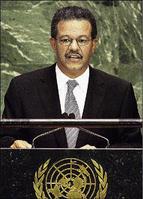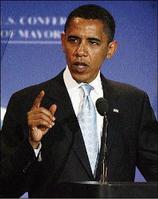2008: A year of crisis
Published: Sunday | January 4, 2009

Robert Buddan POLITICS OF OUR TIME
President Leonel Fernandez of the Dominican Republic told a meeting of Latin American and Caribbean leaders in Brazil in December that the world recession would cost $60 trillion, more than the combined GDP of all the economies on Earth. It would take, he said, another 10 to 15 years before the world economy is back where it was before the crisis. This is not just sobering, it is frightening.
If 2008 were a year of crisis, 2009 could be worse since no one really knows when and where the crisis will bottom out. President Fernandez said that the United States was not telling the whole truth about the depth of the crisis.
Jamaica ended the year with a stimulus package, one that should have come with the Budget in April 2008. After all, crisis management is about managing crises before they happen and we had ample signs before of what was about to happen. But the stimulus package, when it came, presumed that the crisis, which is not even fully acknowledged by the Government, is short-term. The cost of the recession, however, as President Fernandez has been much more realistic to point out, might be long-term and require, as he said, a new kind of economics, one still to be invented.
SUSTAINABLE POLICIES
After all, how long can countries like Jamaica do what we did in 2008? How long can they dip into the Net International Reserves or borrow from the multilaterals to support the exchange rate? How long can governments that are already heavily indebted support subsidies while trying to balance the Budget? How long can governments that cannot collect due revenue stimulate sectors by reducing General Consumption Tax, increase the income tax threshold and remove or reduce import taxes to manage the cost of living?
These policies are not sustainable. However, much our circumstances might limit our response to these stimulus policies; they are not sustainable. This is why structural changes in economies are necessary and that is what the leaders of the region were talking about in Brazil. Structures have to do with the rules and conditions of an arrangement and policies have to do with the moves one makes within those arrangements. If the rules and conditions are against you then the moves you make will have limited impact. The lesson of 2008 is that the structures that have failed the poorer countries over the many years, which is why they are poor, have now failed the rich countries. The Brazil summit concluded that the rich countries must take responsibility for the world economic crisis.
As a country and a region we must take responsibility for our survival. We must work with our closest neighbours in the Caribbean and Latin America. PetroCaribe, for example, has been our real lifesaver, not the multilaterals as Golding claims. PetroCaribe stands out as the best example of the benefits of regional cooperation.

President of the Dominican Republic, Leonel Fernandez Reyna.- file
DOING MORE OURSELVES
We should ask President-elect Barack Obama to extend temporary protected status to Jamaica and the Caribbean, which would suspend deportations. In the meantime, a better way could be found to manage the arrangement. The Caribbean has the highest per capita murder rate in the world and although all deportees are not criminals, there is a strong association between deportations and criminality. At the same time, we must get away from the idea that we can simply change a government, a minister of national security and a police commissioner and the crime problem will be solved. We must go back to values, parenting, education, work and community guardianship.
We must pay our taxes, which remains an abysmal problem. We will have to pay for better policing because right now, with our revenue system in the shape that it is, we cannot pay for much without sourcing more loans or getting more from those who already pay the bulk of our taxes. There is a limit to what we can borrow or tax.
We must conserve more and work harder towards energy alternatives. E10 has been cheaper and popular with motorists. Let us teach our farming communities more about biogas. Let us continue to build our highways, which cut distance and time and we might charge smaller engine vehicles a cheaper toll to encourage more use of such vehicles and save further on gas usage.
We must broaden our tourism product because the evidence shows that all-inclusives are not contributing to eradicating poverty in their surrounding communities. We are spending far too much promoting an industry for the few. We must remember that Jamaica - all of Jamaica - is a destination.
We must heed the credit agencies' review that our economy is too narrow. We must broaden it to include small and medium-sized and micro-business and provide them with training, credit, insurance, infrastructure, utilities and markets, just as we spend enormous amounts on big business.
We must also heed the warning of the Inter-American Development Bank that poverty levels could rise and in fact, almost double. We must protect our social gains and find creative ways to employ the skills of our people. The Food and Agriculture Organisation of the UN has now announced that high food prices have added 40 million hungry people to the already near one billion who will go hungry in 2009.

United States President-elect Barack Obama.
CLASS AND GOVERNANCE STRUCTURES
Ultimately, we must take more responsibility to change the rules and conditions by which we live, work, play and study. We cannot continue to have the same class structure with such glaring inequality in income, education, residential, housing and domestic conditions. The Government's stimulus package of December actually failed to make good of an opportunity to provide support based on principles of equity, inclusion and empowerment. Who decided who got what, and who should benefit and how?
A recent study by the World Bank, the Economic Commission for Lain America, and the United Nations Conference on Trade and Development, concluded that equity (equal access to opportunity), especially by children, and equality (equal access to rewards), including income and education, were the critical factors that led to improvement in the quality of life over generations. The stimulus package did not seem to follow any broad developmental principle, such as the principle of equity.
Another lesson we must therefore learn in 2008 is about how we govern ourselves. Principles like equity must guide policies. Good management is a key to good governance. Good management anticipates a crisis and responds quickly. It also requires managers people can trust. There have been too many questions about governors who might be subject to criminal action; the loyalty of parliamentarians with dual citizenship; and board members of government agencies whose competence, integrity and neutrality to conflict of interest have come into question.
Good governance inspires, gives people hope and mobilises people for sacrifice. People need hope and what they hope for is for change in the quality of their lives. How much can Jamaicans really hope for a safe and productive country in 2009?
Robert Buddan lectures in the Department of Government, Mona Campus, UWI. Email: Robert.Buddan@uwimona.edu.jm.
